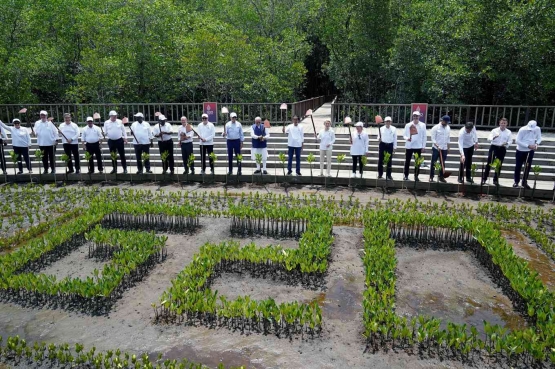The ocean already makes a significant contribution to the global economy through resources, jobs, livelihoods, food, and transportation, and has the potential to become a major source of clean energy from offshore waves, solar, and wind. Healthy oceans are also important for regulating the climate system and weather and, as mentioned above, are the largest carbon sinks on Earth. However, several major anthropogenic causes are seriously compromising ocean health. We all know that: Severe global warming is causing climate change, resulting in accelerated ice melt, sea level rise, and acidification. From plastics to chemicals and other substances, most of the world's pollution ends up in our oceans. At the same time, overexploitation and a lack of consistent and sustainable fishing strategies, have led to significant declines in species.
For the above reasons, the realization of OCEAN 20 is considered important. Business and government leaders at the global level, as well as local, national and regional levels, can and should play a key role in changing this paradigm. Leaders from all G20 sectors, individually or collectively, can address market dynamics and expand trade. Ensure effective governance, policy-making, and implementation, increasing the resilience of marine and coastal ecosystems through sustainable best practices.
What is Indonesia's role as President and host of the 2022 G20 Summit regarding OCEAN 20?
Indonesia, this year's President and host of the 2022 G20 Summit, will lead by example, investing heavily in marine and coastal ecosystem governance, promoting equitable economic access, reducing marine litter, restoration of Mangroves and other wetlands. Indonesia's mangroves are said to help mitigate the impacts of climate change as they store substantial amounts of carbon equivalent to about 3.1 billion tonnes. This equates to greenhouse gas emissions from driving about 2.5 billion cars a year.
Indonesia has 3.5 million hectares of mangroves, about 23% of the world's total mangroves, and the most diverse of 92 true mangrove species. Unfortunately, Indonesia loses a significant amount of mangroves each year. Much of this mangrove loss is caused by the conversion of mangrove forests in Kalimantan and Sulawesi to ponds, especially for shrimp. Not only are mangrove forests being converted to ponds, but mangroves are also being lost due to conversion to oil palm plantations and coastal development for urban expansion. This poses a threat to the mangrove ecosystem and becomes a problem, not only in Indonesia but also in the world.
During a series of G20 events in Indonesia, President Joko Widodo invited world leaders attending the 2022 G20 Summit to plant mangroves together. This series of events is a form of shared engagement to tackle global climate change, in line with the G20 theme of 'Recover Together, Recover Stronger'. Mangroves are known to absorb carbon, protect the land from erosion, provide habitat for marine life, and prevent sea abrasion. It is hoped that the mangrove planting event will become a driving force for the regeneration of mangrove forests towards the creation of a blue economy, which is the goal of the OCEAN 20 implementation.

Indonesia-Australia Cooperation in OCEAN 20
One of the Press Releases regarding OCEAN 20, there is one that mentions Indonesia-Australia cooperation in the context of organizing OCEAN 20. Deputy Marine Resources Coordinator in support of OCEAN 20 hosted a Blue Carbon Workshop on Seagrass Ecosystems and Livelihoods from 5-7 October 2022 in Labuan Bajo, East Nusa Tenggara. The conference was attended by international and subject matter experts, including Andy Steven (CSIRO-Australia), Carlos Duarte (KAUST-Saudi Arabia), Neil Dave (Google X), and Stevan Lutz (GRID-Arendal). The governments of Indonesia and Australia have joined the Indonesia-Australia Blue Carbon Program to provide actionable policy recommendations, particularly related to blue carbon in seagrass ecosystems.
According to Plt. Deputy for Coordination of Marine Resources, Indonesia will always support the development of a blue economy and blue carbon to create a healthy and sustainable ocean, especially by combating unsustainable fishing and crime in the fisheries sector, as a substitute for regulating marine resources. Seagrass meadows play an important role as nursery habitats, providing shelter and food, supporting commercial fisheries, biodiversity, and blue carbon, and improving surrounding water quality.
Given the scale of benefits offered, Indonesia and Australia continue to monitor seagrass ecosystems for development, with collaborations including joint research, capacity building, and technology and knowledge transfer. To help build capacity and raise awareness to protect the world's largest seagrass ecosystem, the Indonesian government has issued Presidential Decree No. 16 of 2017 on the Indonesian Ocean Policy (KKI). The policy consists of seven main pillars, with the fifth pillar governing marine spatial planning and protection of the marine environment. Some strategic guidelines and priorities in Indonesia's marine spatial management are the currently integrated Land-Sea Spatial Plan, Management of Marine Protected Areas, and Indonesia's Marine Health Index (IKLI).









